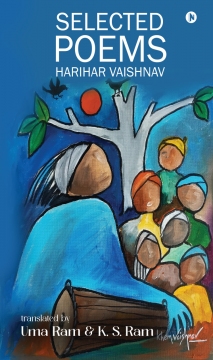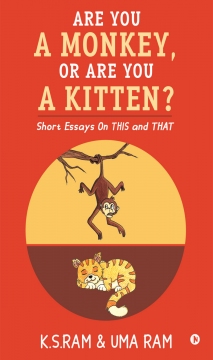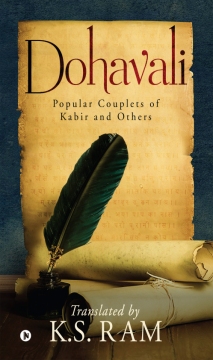
- Discover books
- For Writers
-
For Writers
-
Indie Author Championship
-
Challenges
Writing Contests
- Get Started

"It was a wonderful experience interacting with you and appreciate the way you have planned and executed the whole publication process within the agreed timelines.”
Subrat SaurabhAuthor of Kuch Woh Pal -
-
-
IN
- India
- Singapore
- Malaysia
- UAE
- 0
Uma Ram and K. S. Ram
Dr Uma Ram served as Professor and Head, Department of English, Government Kakatiya Post-Graduate College, Jagdalpur (Bastar) in Chhattisgarh for more than three decades. She and her husband, K. S. Ram, write regularly for The Times of India and other journals. They have jointly translated several works from Hindi and Kannada to English. They are joint authors of Tribal Songs, Ballads and Oral Epics of Bastar, published in 2012. They live in Bengaluru. Read More...
Dr Uma Ram served as Professor and Head, Department of English, Government Kakatiya Post-Graduate College, Jagdalpur (Bastar) in Chhattisgarh for more than three decades. She and her husband, K. S. Ram, write regularly for The Times of India and other journals. They have jointly translated several works from Hindi and Kannada to English. They are joint authors of Tribal Songs, Ballads and Oral Epics of Bastar, published in 2012. They live in Bengaluru.
Read Less...
Crop your profile image

Selected Poems: Harihar Vaishnav
Books by Uma Ram, K. S. Ram
This book brings forty poems of Harihar Vaishnav, translated into English by Uma Ram and K. S. Ram. The poems present poignant pictures of the tribes in Bastar, Chhattisgarh, struggling against a changed order which they resent, but are unable to resist. The original text in Hindi is printed alongside the English translation.
Harihar Vaishnav was born in Bastar in 1955, and lived there all his life till his death in 2021. He is best known for h
This book brings forty poems of Harihar Vaishnav, translated into English by Uma Ram and K. S. Ram. The poems present poignant pictures of the tribes in Bastar, Chhattisgarh, struggling against a changed order which they resent, but are unable to resist. The original text in Hindi is printed alongside the English translation.
Harihar Vaishnav was born in Bastar in 1955, and lived there all his life till his death in 2021. He is best known for his pioneering work in bringing to light the four oral epics (jagaar) of the Gond tribes in Bastar.
Winner of the Umesh Sharma Sahitya Samman (2009) given by the Chhattisgarh Hindi Sahitya Parishad; Pandit Sunderlal Sharma Sahitya Samman (2015) given by the Chhattisgarh Government; Verrier Elwin Pratishtha Alankaran (2015), and, Bhasha Samman of the Sahitya Academi (2015)
Are You A Monkey, Or Are You A Kitten?
Books by K.S.RAM & UMA RAM
The short essays in this book have a common string: spirituality, in a practical sense of the word. The range of topics is wide: Love is a Verb-less State of Being; The Price of Money; Not Nothing, I am No-thing; Life Lessons from Chess; Drink While you Pray, or Pray While You Drink?; Another Way to Eat a Mango; Hostile Love; To be a Somebody, Remain a Nobody; In Divine Mathematics, 0=1=∞; etc. Several essays are related to the spiritual outlook of indigenou
The short essays in this book have a common string: spirituality, in a practical sense of the word. The range of topics is wide: Love is a Verb-less State of Being; The Price of Money; Not Nothing, I am No-thing; Life Lessons from Chess; Drink While you Pray, or Pray While You Drink?; Another Way to Eat a Mango; Hostile Love; To be a Somebody, Remain a Nobody; In Divine Mathematics, 0=1=∞; etc. Several essays are related to the spiritual outlook of indigenous peoples, commonly called the tribes. The essays are meant to nudge the reader into self-seeking; to ignite a desire to think forward; to draw on the past wisdom for direction to address today’s concerns and everyday tasks. The language and the presentation are simple, delightful, and gripping.
DOHAVALI
Books by K.S. RAM
Kabir and Rahim occupy an important position among those who have shaped the popular culture in India. The fact that many of Kabir’s compositions form part of the Adi Granth, the Sacred Book of the Sikhs, is evidence to the extent of his appeal. Doha, meaning a two-lined rimed couplet, was a favourite format of Kabir and other poets. Their couplets have acquired the status of proverbs, quoted in the Hindi-belt a hundred times every day in c
Kabir and Rahim occupy an important position among those who have shaped the popular culture in India. The fact that many of Kabir’s compositions form part of the Adi Granth, the Sacred Book of the Sikhs, is evidence to the extent of his appeal. Doha, meaning a two-lined rimed couplet, was a favourite format of Kabir and other poets. Their couplets have acquired the status of proverbs, quoted in the Hindi-belt a hundred times every day in conversations at home and in the street. Fifty-one such popular couplets, published earlier in 1986, are presented in this diglot edition, where the attempt is not just to translate but to trans-create the doha in English.
“The Dohavali versions are excellent!”- P. Lal, Poet, Translator and Editor
“I have not come across any sincere transcreations (of Kabir’s dohas) than yours. I go by the ear. And your renderings do bring over the dhvani of the originals.” - Mulk Raj Anand, Novelist
Bastar and Miscellaneous Poems
Books by K.S. Ram
Bastar is a series of poems on Bastar, a part of the ancient Dandakaranya (modern-day Chhattisgarh). It is home to some of the most primitive and wonderful forest-tribes in the world. For over a century now, the tribes are reeling on the one hand, under the ways of bossy petty officials, traders and, now, the Naxals and, on the other hand, the ‘schemes’ of the Government and the evangelists who presume that the good of th
Bastar is a series of poems on Bastar, a part of the ancient Dandakaranya (modern-day Chhattisgarh). It is home to some of the most primitive and wonderful forest-tribes in the world. For over a century now, the tribes are reeling on the one hand, under the ways of bossy petty officials, traders and, now, the Naxals and, on the other hand, the ‘schemes’ of the Government and the evangelists who presume that the good of the tribes lies in ‘mainstreaming’ them. Bastar Rebellion (called ‘Bhumkal’) in 1910 was a flashpoint of the tribal rage against such ‘development.’
It was a rape of our faith by a people,
Who professed religion, practised rituals,
Yet did not share our sense of the sacred.
Bhumkal [=’Earthquake’]
The 35 poems in this section are vignettes of this socio-spiritual-cultural conflict that continues even today. The author likes to describe this work as ‘documentary poems.’ Bastar, he believes, is a narrative of indigenous societies crumbling the world over under settlers’ greed.
The second section of the book contains 33 Miscellaneous Poems on a wide range of unconventional topics, all with a spiritual undercurrent.

Are you sure you want to close this?
You might lose all unsaved changes.
Select from one of our global stores to continue
 India
India
 Malaysia
Malaysia
 Singapore
Singapore
 UAE
UAE
Warning Message
The items in your Cart will be deleted, click ok to proceed.














